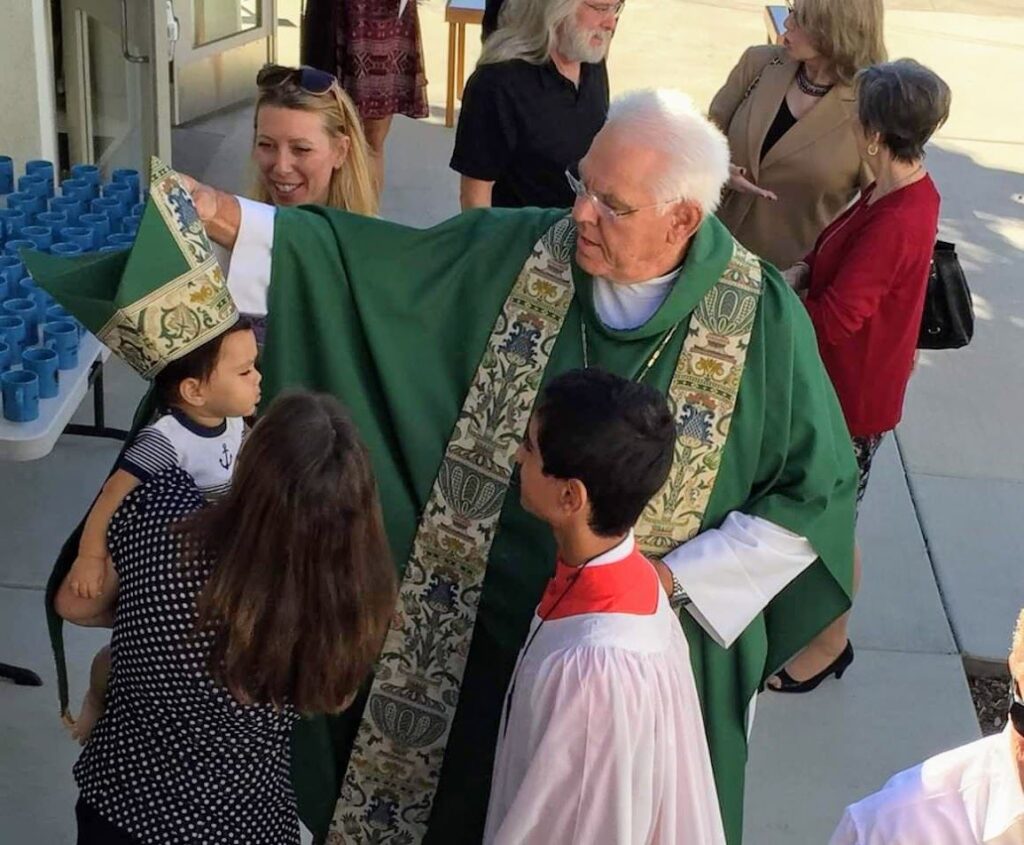
Bishop Jon Bruno playfully places his miter on the head of a little parishioner at Christ Church, Redondo Beach, during one of the hundreds of pastoral visits he made during his tenure as bishop. Photo: Bob Cornner
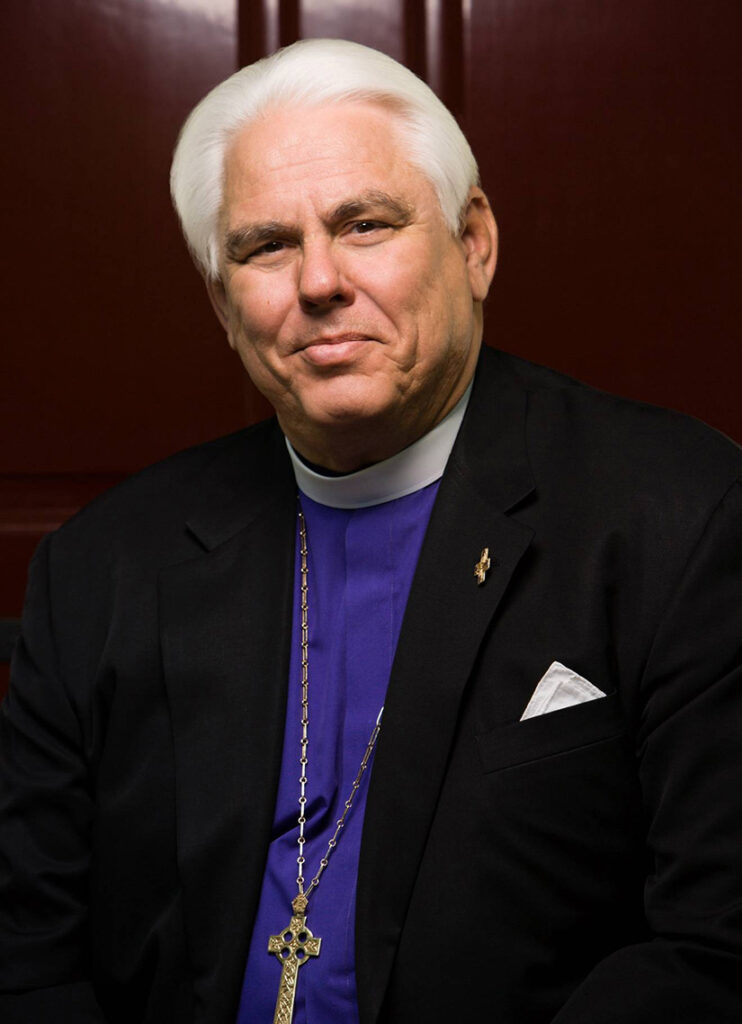
J. Jon Bruno
The Rt. Rev. J. Jon Bruno – who as bishop of the six-county Episcopal Diocese of Los Angeles from 2002 to 2017 widened the church’s welcome of all people by prophetically narrowing gaps created by race, gender, sexual orientation, and economic disadvantage – died April 23 at his home in La Quinta, Calif. He was 74, and Mary, his wife of 35 years, was at his side as he suddenly succumbed to natural causes, a family statement said.
“Our family and the many others who knew and loved Jon have been blessed with his magnificent life,” Mary Bruno said in the statement. “We are gladdened to know that he has been greeted by St. Peter and is in the loving hands of God. We ask that our family is included in your prayers and our privacy respected in this time of grief.”
Survivors also include Bruno’s daughter, Jonelle; his son, Philip, and his wife, Mary; his stepson, Brent Woodrich, and his wife, Andrea; nine grandchildren; and many friends. He is predeceased by his sister, Toni Rae Bruno Taix, a Los Angeles attorney.
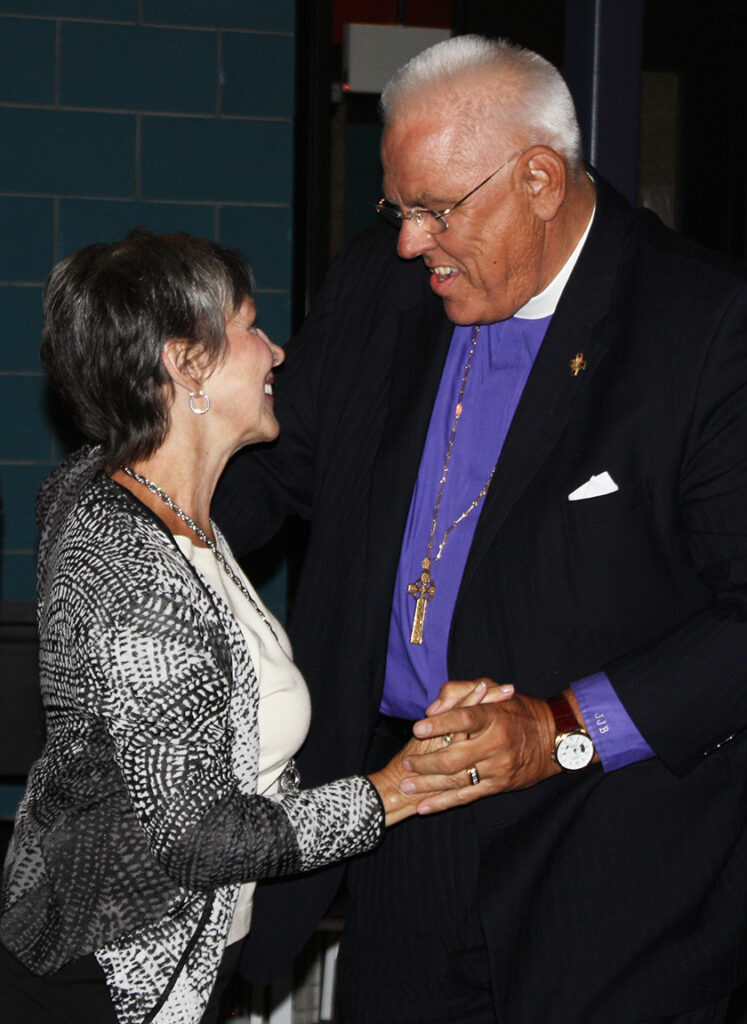
Jon and Mary Bruno dance at a reception at Church of the Epiphany, Los Angeles, in 2013. Photo: Janet Kawamoto
A private family requiem, with online livestream, is planned on Saturday, May 1, 11 a.m., to give thanks for Bruno’s life and ministry. The service may be viewed here.
Once COVID restrictions have eased, an in-person diocesan gathering in late summer or early fall is envisioned to honor Bishop Bruno. Arrangements are pending.
“I know I speak for hundreds of lay and ordained folk all over our diocese when I say that the sudden loss of our friend, mentor, counselor, teacher, and advocate triggers a grief too deep for words,” Bishop John Harvey Taylor said. “Most of all, I remember Jon’s encouragement, his love, his smile, his twinkle, and his everlasting ‘yes.’ His legacy will continue to light us along the way. These early days and weeks, I know we’ll pray hardest for Mary and their family, who feel this loss most of all.”
Los Angeles Mayor Eric Garcetti paid tribute to Bruno as “a pillar of peace and goodwill across our city” noting that “Los Angeles lost an angel of courage and a leader of conscience this week, and I lost a counselor, a confidant, a brother and a dear friend.”
Early in his tenure as a city council member representing Echo Park, Garcetti came to work closely with Bruno, and most recently the two prayed during a weekly phone call shared by clergy active in the mayor’s life. “For nearly two decades, I have held a bible from Bishop Bruno as a source of inspiration; for the past year, I have benefited from his prayers every Friday; and for the rest of my days, I will carry his ‘shepherd’s voice’ with me as a fount of wisdom, healing, and faith,” Garcetti said.
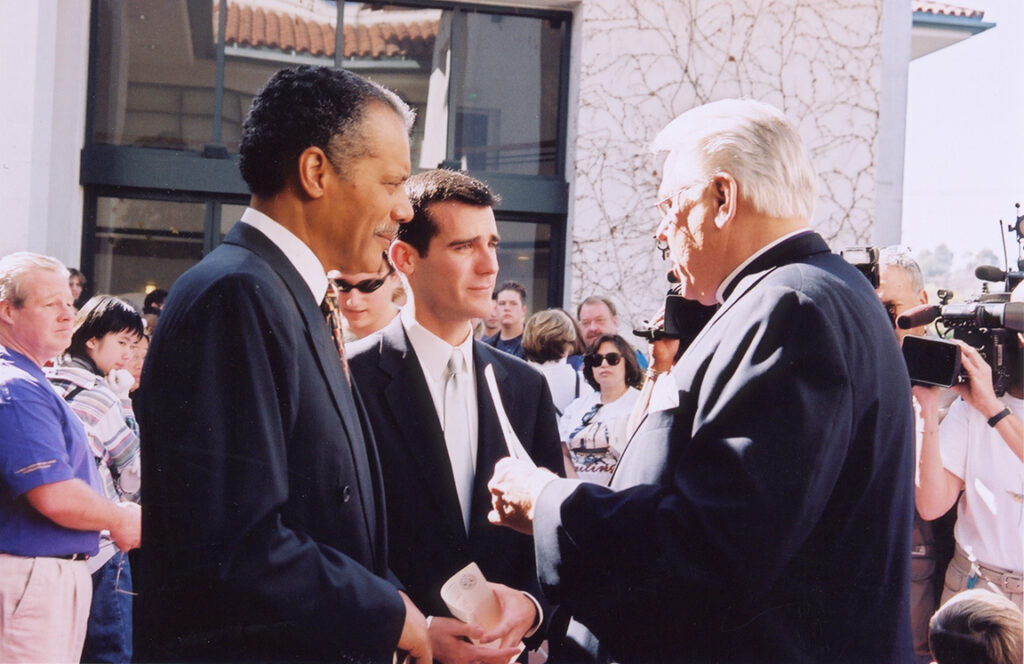
Los Angeles City Police Chief Bernard Parks and Councilman Eric Garcetti speak with Jon Bruno at his 2002 installation as bishop of the Diocese of Los Angeles. Parks later served as an L.A. City councilman, and Garcetti was elected mayor in 2013. Episcopal News file photo.
The Rev. John Cager, pastor of Ward A.M.E. Church who succeeded Bruno as two-term president of the Los Angeles Council of Religious Leaders, said, “Progressive, passionate and purpose-driven are the words that define Bishop Bruno’s approach to ministry. As the first native Angeleno to lead the Episcopal diocese, he brought leadership that was authentic to the Gospel while also relevant to the region.”
“It is hard to express my deep sadness at losing this bishop, this mentor, this friend,” said L.A.’s Bishop Suffragan Diane M. Jardine Bruce, who started her episcopate in 2010 during Bruno’s tenure as bishop diocesan. “He left a deep impression on everyone he met. His kindness and generosity were legendary. He let me ‘run’ with mission and ministry as bishop suffragan, and I will never forget that great gift. His support of me and my family – especially his prayers for us – were so meaningful. Jon and Mary are much beloved in the Bruce household.”
Retired Bishop Suffragan Chester L. Talton, reflecting on 30 years of association as fellow clerics who served the diocese from 1999 to 2009 together as bishops, said “Jon Bruno, my very good friend, has left this life, leaving a very large place. I feel the earth has tilted because he was such a generous and very caring person. I think his ministry as a bishop was significant, but he was a pastor first. I will miss my very good friend.”
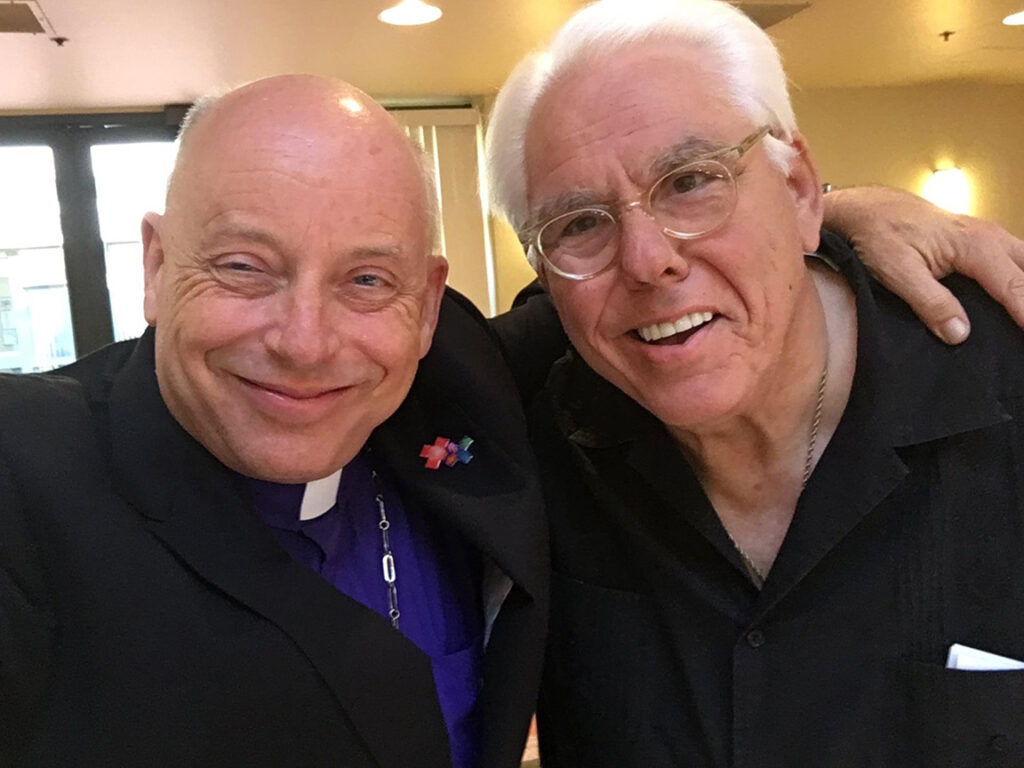
Bishops John Harvey Taylor and J. Jon Bruno pose for a selfie in 2017. Photo: John Taylor
“Bishop Bruno had a huge heart that made him see what others couldn’t and gave him a vision for what others might call impossible,” said the Rev. Canon Melissa McCarthy, who was ordained to the priesthood during Bruno’s tenure and now serves the diocese as canon to the ordinary. “Bishop Bruno made an immediate impact and he has left a lasting legacy.
“Bishop Bruno lived his faith out loud,” she added. “Being around him always taught me something new about what it meant to be human, to be a Christian, and ultimately what it meant to be a priest.”
Withstanding adversity
While bishop, Bruno weathered controversies that began in 2004 when a majority of members of four Southland parishes voted – in protest of the 2003 election of openly gay New Hampshire Bishop Gene Robinson – to disaffiliate with the Episcopal Church, refusing to vacate sites in La Crescenta, Long Beach, Newport Beach, and North Hollywood which California courts later affirmed as properties held in trust for the denomination and the diocese.
The California Supreme Court’s 2009 decision in favor of the Episcopal Church established precedent for other property disputes statewide and was credited largely to Bruno’s legal vigilance. But his complex decisions later to sell the Newport Beach property to developers drew mixed reactions of support and ire and ultimately led to, at the denominational level, an ecclesiastical trial and Bruno’s compliance with a three-year ministry suspension fully lifted in 2020. In 2018 a diocesan-wide reconciliation process ensued, and the congregation of St. James, Newport Beach, was restored to active ministry on site.
Following Robinson’s 2003 election, Bruno commented: “The Church has been through many traumatic times in the last 2,000 years, not the least of which was the ordination of women and the consecration of female bishops. Things have been even worse at other times – the period of the Inquisition, for instance – times of hostility to one another, claiming all sorts of heresy. If we focus on the problems, we end up being negative-doers rather than looking at the proactive way in which to deal with every given situation.
“I will proactively live into the Gospel – and it’s really simple when you think about the fact that the summary of the Law tells us to love the Lord our God with our whole heart, mind and soul, and our neighbor as ourselves. It doesn’t say anything about agreeing with my brothers and sisters about the presence of Jesus in their lives, or the way they interpret the scriptures, but I will uphold their right to be who they are, and I will continue to be the person God intends me to be.”
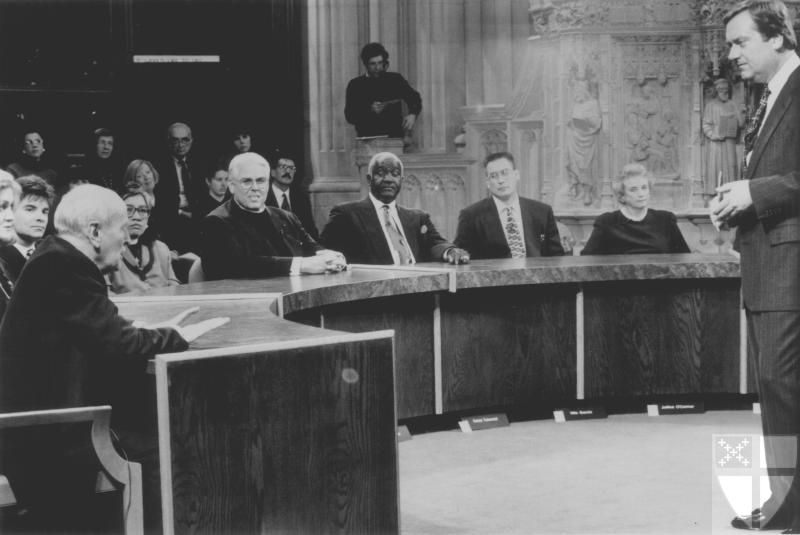
At Washington National Cathedral, Jon Bruno, then provost of L.A.’s Cathedral Center, joined Justice Sandra Day O’Connor (far right), former White House communications director George Stephanopoulos (third from left) and other panelists in a Dec. 4, 1994 teleconference titled “”The Church in a Violent Society–Responses to Domestic and Community Violence.” Photo: Ken Cobb, Episcopal News Service
Angeleno in action
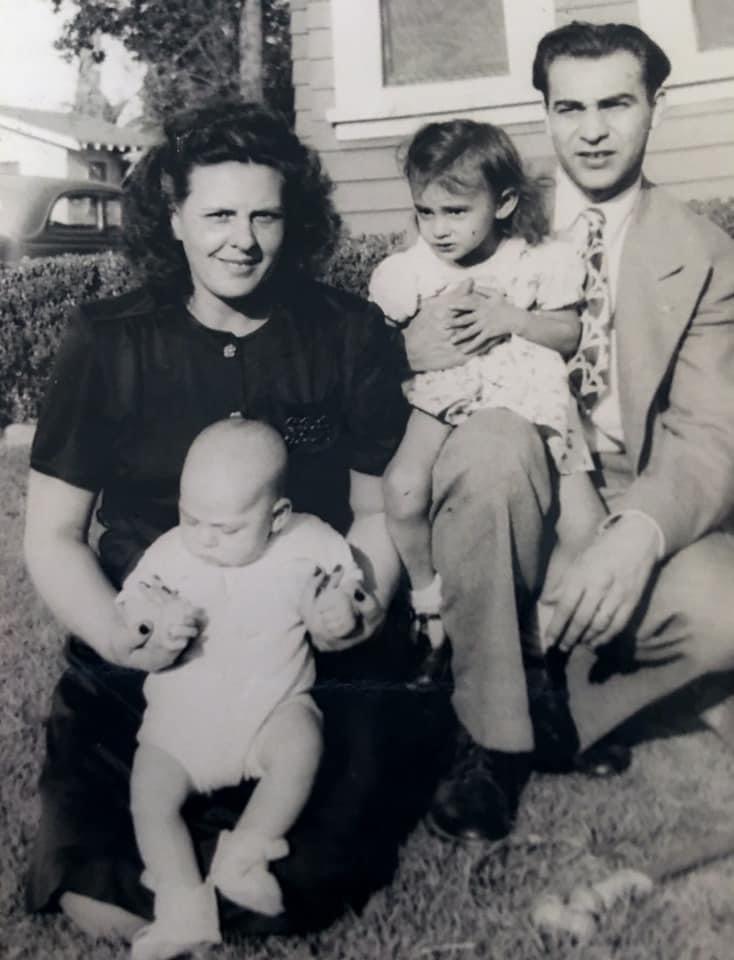
Dorothy and Joseph Bruno pose in 1948 with their daughter, Toni Rae, and their infant son, Joseph Jon. Photo courtesy of the Bruno family.
Joseph Jon Bruno was born November 17, 1946 in Los Angeles and grew up, in a close-knit Roman Catholic family, in the Echo Park and Maravilla sections of Los Angeles. He graduated from L.A.’s Garfield High School, then from Cal State L.A. with a bachelor’s degree in physical education – having trained for a career in professional football – and the Virginia Theological Seminary, from which he later received an honorary doctorate. He held a certificate in criminology from Cal State Long Beach and served as a police officer in Burbank, California.
During his youth, Bruno entered the Episcopal Church through the parish of Epiphany, Lincoln Heights, and decided to pursue the priesthood, having been influenced by his father’s own interest in himself becoming a Jesuit.
Ordained to the priesthood by Bishop Robert C. Rusack in the Diocese of Los Angeles in 1978, Bruno served churches in Thousand Oaks and Pomona, Calif., and Eugene, Oregon, before beginning ministry as rector of St. Athanasius Church in Echo Park in 1986. There he conceived of the idea to build, on that site, the Cathedral Center of St. Paul and was installed as its first provost in 1994 by Bishop Frederick H. Borsch. He succeeded Borsch in 2002 as sixth bishop of Los Angeles, having been elected bishop coadjutor in 1999. Bruno was ordained and consecrated to the episcopate on April 29, 2000 at the Los Angeles Convention Center with a congregation of some 4,000 attending from across the diocese.
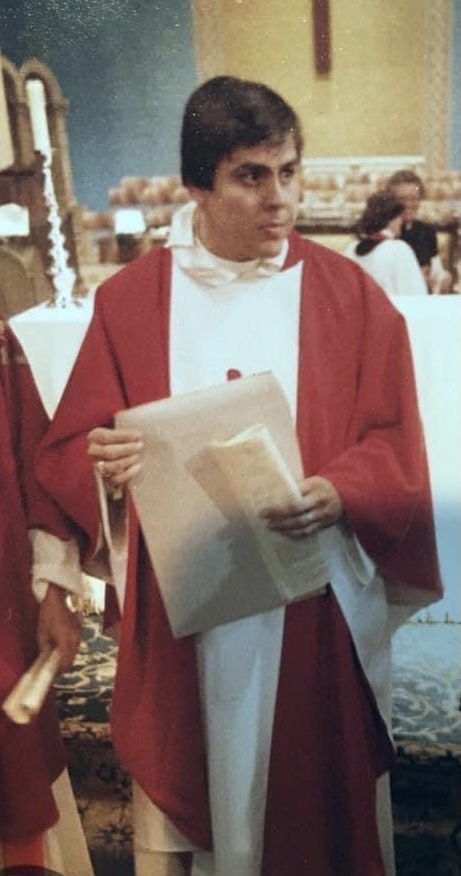
Jon Bruno was ordained to the priesthood in 1978 by Bishop Robert C. Rusack. Episcopal News file photo
Rusack deployed Bruno for ministry in Echo Park in 1986 after an internal dispute split the congregation and the neighborhood was rife with gang violence. As Bruno recalled years later: “When Mary and I drove up to the wooden church on that first Sunday, it was surrounded by weeds and there were 17 people in the parish. In the car we bowed our heads and prayed and agreed to love the people into greater abundance of life.”
With the eventual help of senior warden Canon Randolph Kimmler and junior warden Donna Machado, the Brunos led the congregation to heal and grow and serve the community, especially at the height of the AIDS crisis. Drawing from her experience as a human resources executive with First Interstate Bank, Mary Bruno found data-entry jobs for parishioners living with HIV/AIDS, and Jon Bruno offered pastoral care epitomized by an iconic photo of him seated in a rocking chair holding a church member who had requested this care while nearing death.
Concurrently Bruno worked closely with the staff of El Centro del Pueblo, a gang-prevention agency then located in the basement floor of St. Athanasius Church. Bruno specialized in mediation between members of warring factions, education for youth, and pastoral care of families, especially those whose loved ones he buried from the parish.
Bruno first served St. Athanasius Church on a part-time basis while also employed as general manager of nearby Taix restaurant, of which his brother-in-law, Raymond Taix, was principal owner.
In these years, with Bruno’s care, the remnant members of St. Paul’s Cathedral – who had been meeting in Good Samaritan Hospital’s All Souls Chapel since the cathedral was razed in 1980 – united with St. Athanasius, forming an alliance of two congregations descended from L.A.’s first Episcopal parish, formed in 1864. The newly merged congregation was then known as St. Athanasius & St. Paul.
Spanish-language services were added, led by the Rev. Philip Lance, who, ordained as an openly gay assisting priest, received Bruno’s strong support and later went on to found leading charter schools in the surrounding region.
In 1988, his first year as bishop, Borsch tapped Bruno’s expertise in parish stewardship and named him the diocesan stewardship officer on a half-time basis. As Borsch implemented plans to build the Cathedral Center, he named Bruno its first provost, a role in which he continued until his election as bishop coadjutor in 1999.
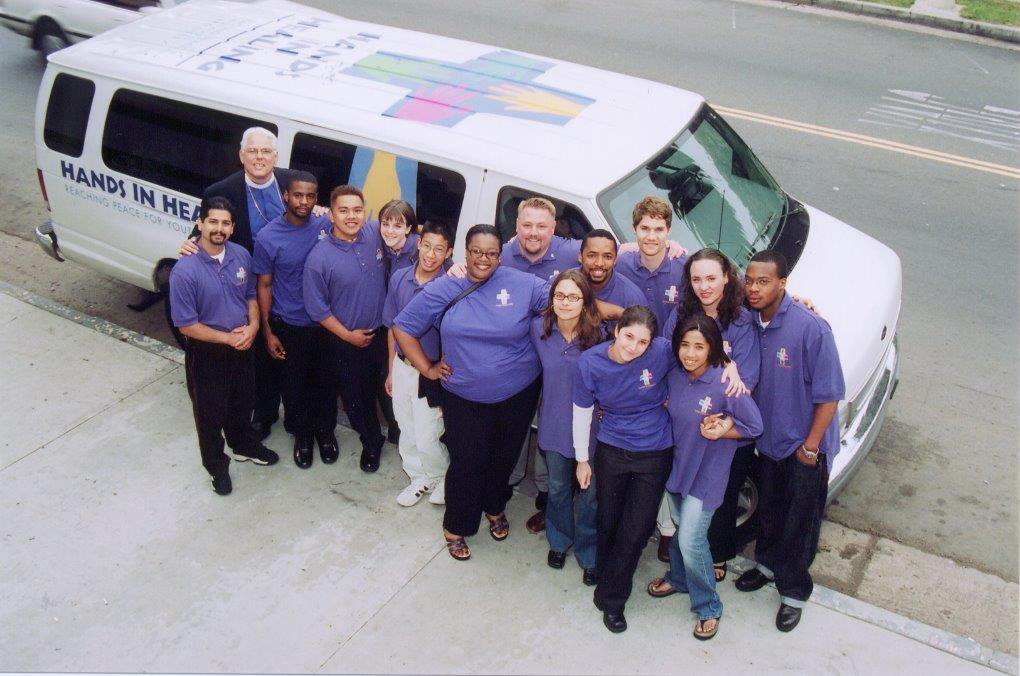
Bishop Jon Bruno and a group of young people from the Diocese of Los Angeles prepare to set out on the Hands in Healing pilgrimage on April 19, 2002. Photo: Bob Williams
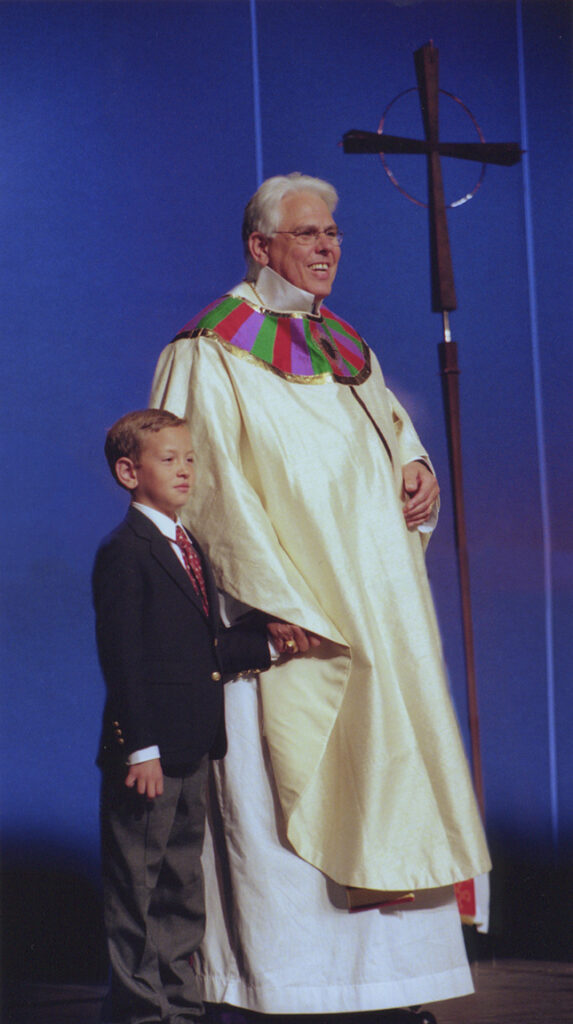
Jon Bruno, with his grandson Christopher Rivers at his side, greets the congregation at his 1999 consecration as bishop coadjutor.
Hands in Healing
Elected by Diocesan Convention as a petition candidate from the floor, Bruno chose for his episcopate the theme “Hands in Healing” as a means of inspiring others to mend effects of violence, discrimination, and loss. “The more we join our hands and hearts together, the harder it is to pull us apart,” Bruno often said, fingers interlaced, notably at his Feb. 9, 2002 investiture when members of the diocese joined hands in solidarity around the full perimeter of Echo Park Lake.
In the wake of the Sept. 11 terrorist attacks, Bruno launched his first year as diocesan bishop with a series of county-based forums involving elected officials, law enforcement officers, and community leaders in efforts to reduce violence and crime.
The series preceded a 2002 nationwide “Hands in Healing” pilgrimage of diocesan youth leaders whom Bruno and colleagues led to sites including New York’s Ground Zero; the Oklahoma City bombing memorial; the Wyoming fence where Matthew Shepard was left to die; the Islamic center in Dearborn, Mich.; the National Civil Rights Museum in Memphis; and in Washington D.C. the Pentagon, the National Cathedral, and a private meeting at the Supreme Court with Chief Justice Stephen Breyer.
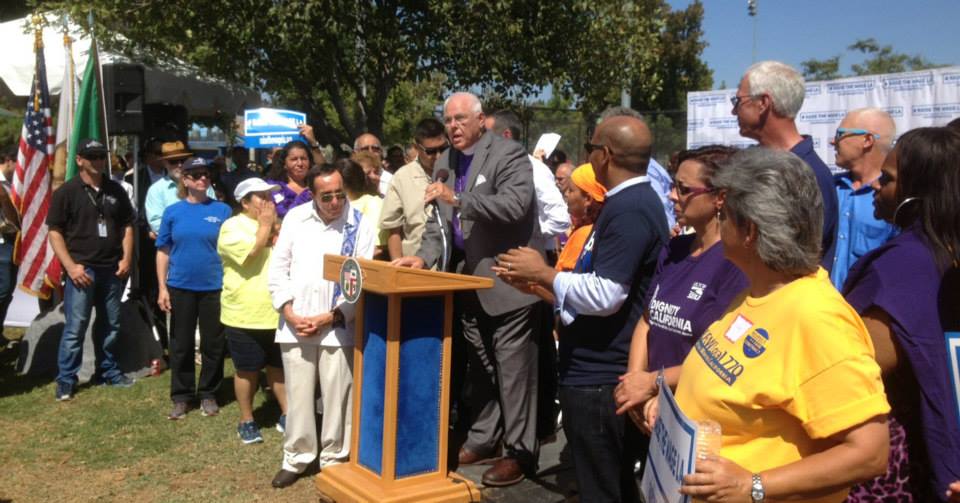
Jon Bruno speaks at a 2014 rally for an increase in the minimum wage. Other keynoters included L.A. Mayor Eric Garcetti and philanthropist Eli Broad. Photo: Bob Williams
Soon after, Bruno expanded the Hands in Healing mission to focus on peacemaking in the Middle East, establishing a series of youth and adult pilgrimages anchored at St. George’s Cathedral and Guest House in Jerusalem. His collaboration with Jerusalem’s Archbishop Suheil Dawani brought about a companion diocese relationship that continues with Los Angeles at present, and Mary Bruno launched the “Educate for Hope” initiative raising funds for school students in Zababdeh, a West Bank township.
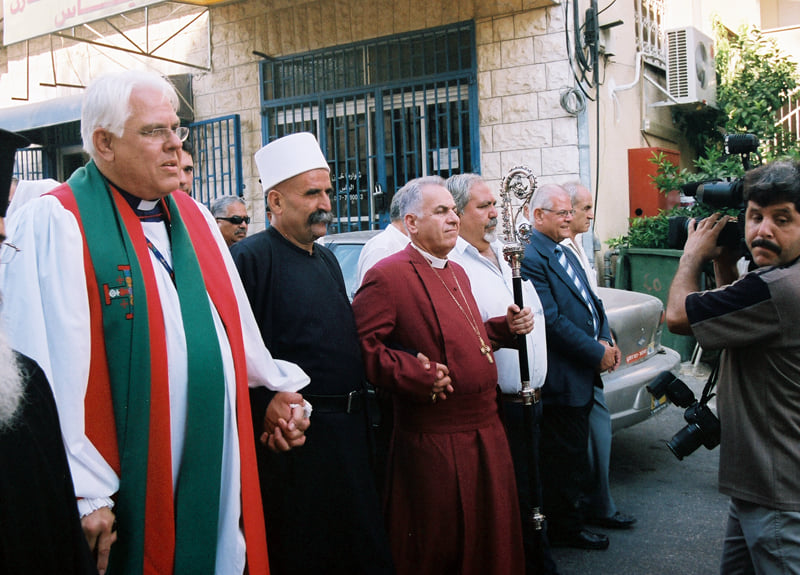
Bruno, with Suheil Dawani, Anglican bishop in Jerusalem, and local religious leaders, walk in the town of Shefa Amr during a Diocese of Los Angeles pilgrimage to the Holy Land in 2007. Photo: Chris Tumilty
Bruno’s commitment to the international ministries of the Anglican Communion brought him into contact with leaders including Archbishop Desmond Tutu, whom Bruno hosted twice in Los Angeles. Bruno was a leader of the Compass Rose Society, a fundraising arm for the Anglican Communion, and provided a major gift for the opening of the communion’s new headquarters in London. He attended the Lambeth Conference in 2008.
When tensions roiled the Anglican Communion after the Episcopal Church’s 2003 General Convention opened the way for New Hampshire’s partnered gay bishop, Bruno joined Virginia Bishop Peter Lee on a London visit to Archbishop of Canterbury Rowan Williams seeking to identify paths forward. Bruno had previously hosted Williams as keynoter at a diocesan clergy conference, and in 2009 welcomed him to Anaheim for General Convention. Elected in 2006 to a six-year term as a member of the Episcopal Church’s Executive Council, Bruno sought churchwide understanding and reconciliation, as he also did within the House of Bishops.
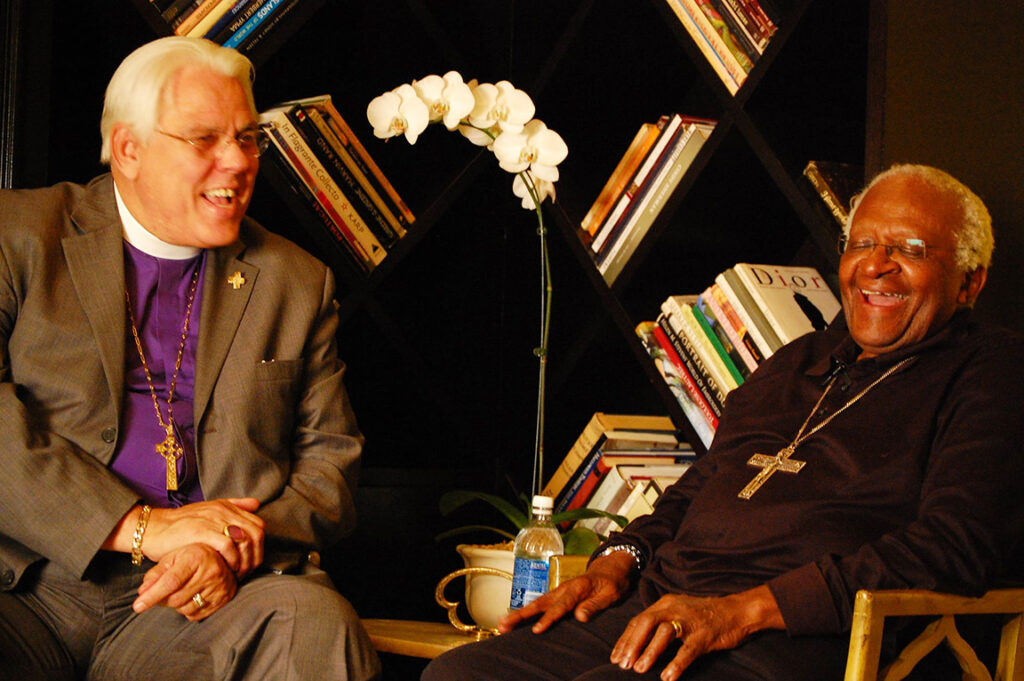
Jon Bruno meets with Archbishop Desmond Tutu of South Africa for a video recording in 2008 in Santa Monica. Photo: Chris Tumilty
During his episcopate, Bruno served in consultation with a succession of three presiding bishops: Frank Griswold, Katharine Jefferts Schori, and Michael Curry. He was aided in ministry by Los Angeles’s assisting bishops Robert Anderson, retired after leading the Diocese of Minnesota, and Sergio Carranza, a previous bishop of the Diocese of Mexico, together with bishops suffragan Talton, Bruce, and Mary Douglas Glasspool.
Throughout these years Bruno remained a champion for LGBTQ+ advancement and marriage equality. In 2004 he drew headlines by blessing, during public rites at the Cathedral Center, the union of the late Rev. Canon Malcolm Boyd and the late Mark Thompson before the couple went on to wed legally in 2013 when allowed by California law. Boyd and Bruno were close friends and colleagues, and Bruno said his decision to stand for election as bishop was prompted by Boyd’s affirmation during a phone conversation.
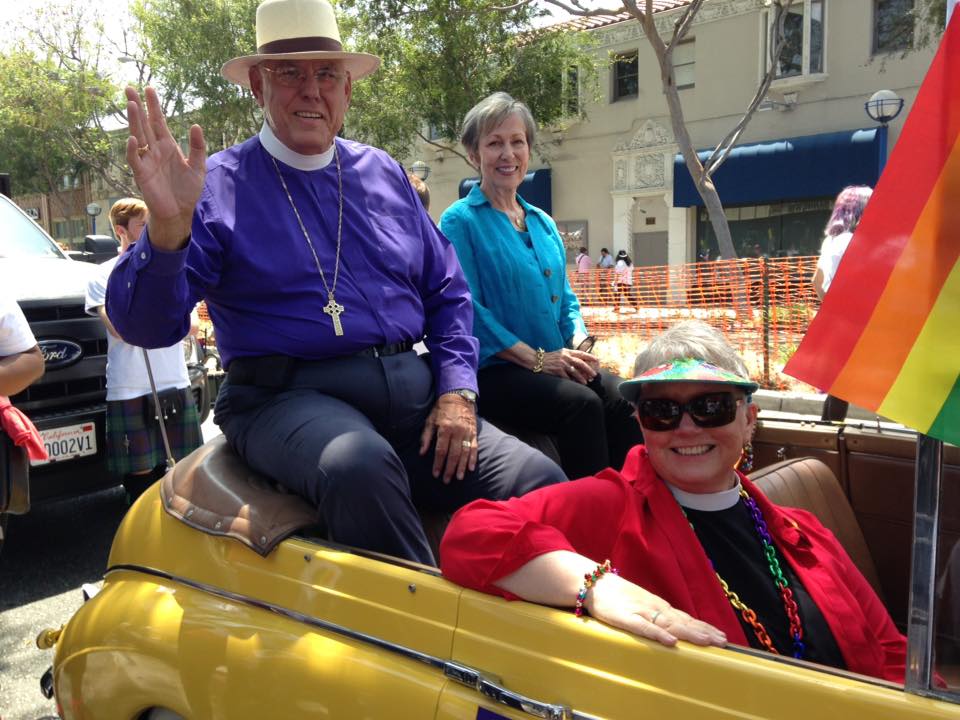
Jon and Mary Bruno, with All Saints, Pasadena, priest Susan Russell, take part in a Pride parade in 2015.
In 2008 Bruno advocated strongly against Prop. 8 which sought to ban same-gender marriage in California but was later overturned by the courts. He named a diocesan task force on marriage and spoke out in local, state, and national settings on behalf of LGBTQ+ initiatives.
Bruno was similarly passionate in advocacy for immigrant rights and dignity. He joined in solidarity with numerous organizations seeking reforms and provisions for DACA youth and decried conditions in border detention facilities, speaking out with religious leaders including Roman Catholic Archbishop Jose Gomez. Bruno was named a “Giant of Justice” by CLUE, Clergy and Laity United for Economic Justice.
Dedicated to the work of interfaith collaboration, Bruno was hailed by the Silver Lake Jewish Community Center in 2010 for providing a loan that helped the agency stay active following the global financial collapse of 2008. In other partnerships, Bruno welcomed the Armenian Church Western Diocese for a major celebration at St. John’s, Los Angeles before he in 2008 named the landmark church the diocese’s pro-cathedral.
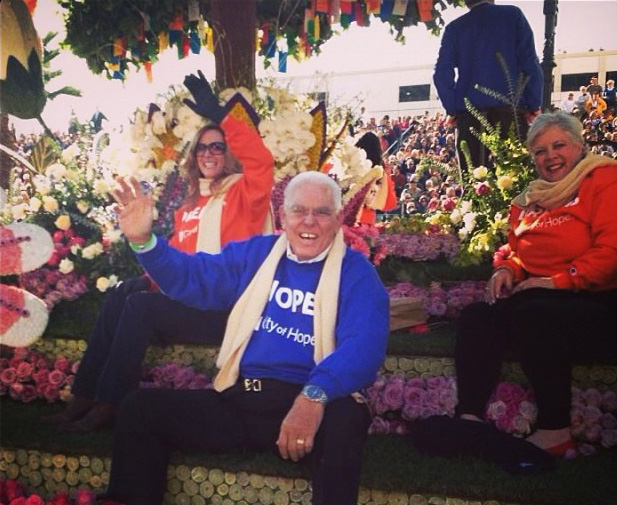
Jon Bruno rides on the City of Hope float in the 2014 Rose Parade. He was successfully treated at the renowned hospital for acute monostatic leukemia.
While president of the Los Angeles Council of Religious Leaders, Bruno widened its Judeo-Christian membership first to include a director of the Islamic Shura Council, and then added representatives of all historic world religions. In 2011 he joined the Council’s then president, Archbishop Hovnan Dederian of the Armenian Church Western Diocese, in coordinating at Los Angeles City Hall the interfaith “OneLight” observance of the 10th anniversary of the Sept. 11, 2001 terror attacks. Representatives of some 500 Southland houses of worship joined Mayor Antonio Villaraigosa and other civic leaders in attending the commemoration, sponsored by then City Council President Garcetti.
Bruno’s faith sustained him through two major health crises, a 2005 foot-and-lower-leg amputation necessitated by an infection, and a 2012 diagnosis of acute monostatic leukemia, from which he recovered through care at the City of Hope. While healing, he set into motion plans to launch the diocesan Seeds of Hope ministry to provide food security and wellness training in communities across Southern California. He also bolstered the study of climate change and environmental care at Studio City’s Campbell Hall Episcopal School.
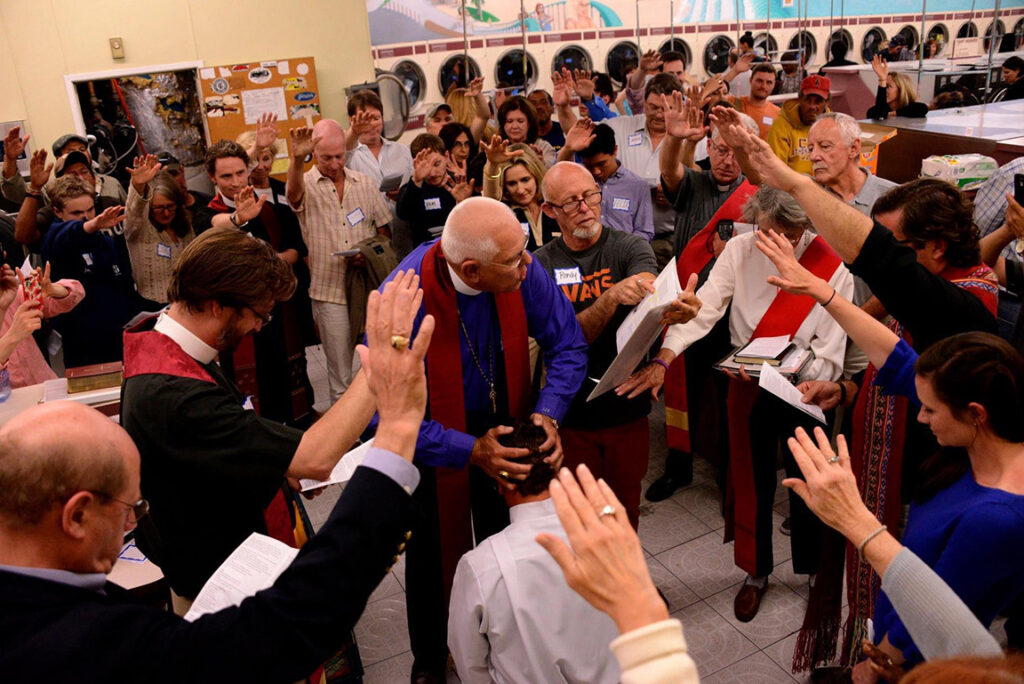
Jon Bruno ordains Scott Claassen to the priesthood during a 2014 Laundry Love session in Venice (Los Angeles). Photo: Chris Tumilty
While bishop he was honorary chair of the boards of the diocese’s several affiliated institutions, including Good Samaritan Hospital and Pasadena’s Hillsides network of services for at-risk children, and leading schools Harvard-Westlake, Campbell Hall, and St. Margaret’s in San Juan Capistrano. He welcomed as one of the diocese’s newest institutions the formerly Roman Catholic Holy Family Services adoption agency, and saved one of its oldest, Neighborhood Youth Association, from financial collapse.
Marking the 150th year of Episcopal parish ministry in Southern California, Bruno presided at 2015 celebratory events including the “Horizons and Heritage” concert that filled the Music Center’s Walt Disney Hall to capacity with clergy and parishioners from across the diocese.
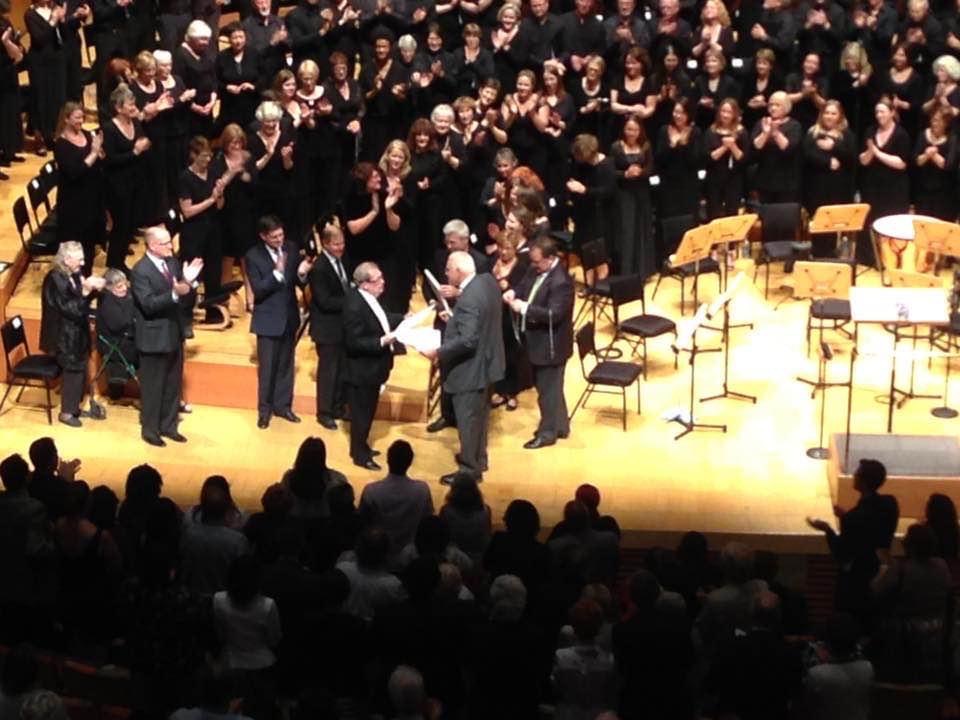
Bishop Jon Bruno names six eminent organists and music directors as honorary canons of the diocese during a concert on June 12, 2015 at Disney Hall in Los Angeles marking the 150th anniversary of Episcopal parish ministry in Southern California. The honorees were James Buonemani (St. James’ Church, Los Angeles), Tom Neenan (St. Matthew’s, Pacific Palisades), Craig Phillips (All Saints’, Beverly Hills), Philip Smith (Church of Our Saviour, San Gabriel), Ned Tipton (St. John’s Cathedral) and James Walker (All Saints, Pasadena).
Both he and Mary Bruno enjoyed Sunday visitations to the diocese’s parishes and missions. “In each and every congregation we have visited, I have found people who are excited about possibilities,” he said shortly after his consecration as bishop coadjutor. “Even when the reason for my being there has not been the most pleasant or anxiety-free, the people of God are willing to roll up their sleeves and work for the needs of their community. I am blessed to serve in a diocese that is committed to evangelism, growth and reconciliation. It is clear to me that Jesus the Christ dwells in the heart of this body that is our Diocese of Los Angeles.”
— Robert Williams serves the Diocese of Los Angeles as its canon for common life and historian-archivist.
This article was updated on April 28 with information about the May 1 family service for Bishop Bruno.
